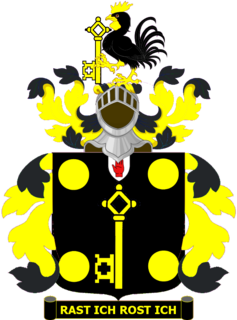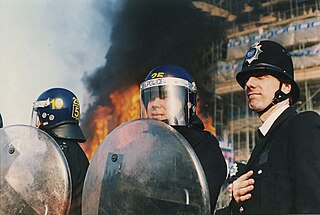
The 2001 United Kingdom general election was held on Thursday 7 June 2001, four years after the previous election on 1 May 1997, to elect 659 members to the House of Commons. Under the leadership of Tony Blair, the Labour Party was re-elected to serve a second term in government with another landslide victory, returning 413 of the 418 seats won by the party in the previous general election, a net loss of 5 seats, though with a significantly lower turnout than before—59.4%, compared to 71.3% at the previous election. Blair went on to become the first Labour Prime Minister to serve a consecutive full term in office. It was dubbed "the quiet landslide" by the media.
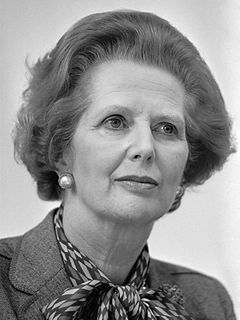
The 1979 United Kingdom general election was held on 3 May 1979 to elect 635 members to the British House of Commons. The Conservative Party, led by Margaret Thatcher, ousted the incumbent Labour government of James Callaghan with a parliamentary majority of 43 seats. The election was the first of four consecutive election victories for the Conservative Party, and Thatcher became the United Kingdom's and Europe's first elected female head of government.

The 1992 United Kingdom general election was held on Thursday 9 April 1992, to elect 651 members to the House of Commons of the United Kingdom. The election resulted in the fourth consecutive victory for the Conservative Party since 1979 and the last time that the Conservatives would win a majority at a general election until 2015. This election result took many by surprise, as opinion polling leading up to the election day had shown the Labour Party, under leader Neil Kinnock, consistently, if narrowly, ahead.

John Smith was a British Labour politician who served as Leader of the Labour Party from July 1992 until his death from a heart attack in May 1994.

The 1987 United Kingdom general election was held on Thursday, 11 June 1987, to elect 650 members to the House of Commons of the United Kingdom. The election was the third consecutive general election victory for the Conservative Party, and second landslide under the leadership of Margaret Thatcher, who became the first Prime Minister since the Earl of Liverpool in 1820 to lead a party into three successive electoral victories.

The 1959 United Kingdom general election was held on Thursday, 8 October 1959. It marked a third consecutive victory for the ruling Conservative Party, now led by Harold Macmillan. For the second time in a row, the Conservatives increased their overall majority in Parliament, to 101 seats over the Labour Party led by Hugh Gaitskell. The Liberal Party led by Jo Grimond again returned only six MPs to the House of Commons, but managed to increase their overall share of the vote to 5.9%; compared to just 2.7% four years earlier. To date, the 1959 general election marks the only occasion since the Second World War when a government has managed to increase its overall majority while seeking a third term in government. However, despite this electoral success; the Conservatives failed to win the most seats in Scotland, and have not done so since. This election marks the beginning of Labour's domination of Scottish seats at Westminster, which lasted until the rise of the Scottish National Party at the 2015 general election. Both future Liberal leader Jeremy Thorpe and future Conservative Party leader and eventual Prime Minister Margaret Thatcher first entered the House of Commons at this election.

Ian Hedworth John Little Gilmour, Baron Gilmour of Craigmillar, was a Conservative politician in the United Kingdom. He was styled Sir Ian Gilmour, 3rd Baronet from 1977, having succeeded to his father's baronetcy, until he became a life peer in 1992. He served as Secretary of State for Defence in 1974, in the government of Edward Heath. He also served in the government of Margaret Thatcher, as Lord Privy Seal from 1979 to 1981.
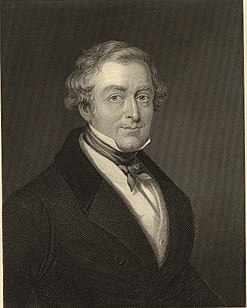
The Conservative Party is the oldest political party in the United Kingdom and arguably the world. The current party was first organised in the 1830s and the name "Conservative" was officially adopted, but the party is still often referred to as the Tory party. The Tories had been a coalition that more often than not formed the government from 1760 until the Reform Act 1832. Modernising reformers said the traditionalistic party of "Throne, Altar and Cottage" was obsolete, but in the face of an expanding electorate 1830s–1860s it held its strength among royalists, devout Anglicans and landlords and their tenants.

The 1990 Conservative Party leadership election in the United Kingdom took place on 20 November 1990 following the decision of Michael Heseltine, former Defence and Environment Secretary, to challenge Margaret Thatcher, the incumbent Prime Minister, for leadership of the Conservative Party.
Sir George Arthur Gardiner was a British Conservative Party politician and journalist. Two months before the 1997 general election he defected to the Referendum Party, becoming the only MP it ever had. The party dissolved later that year.

The 1975 Conservative Party leadership election was held in February 1975, in which the party's sitting MPs voted Margaret Thatcher as party leader on the second ballot. Previous leader Edward Heath stood aside after the first ballot, in which he unexpectedly finished behind Thatcher. The Conservatives were the official Opposition to the Labour government, so Thatcher also became Leader of the Opposition.

When Britain emerged victorious from the Second World War, the Labour Party under Clement Attlee came to power and created a comprehensive welfare state, with the establishment of the National Health Service giving free healthcare to all British citizens, and other reforms to benefits. The Bank of England, railways, heavy industry, and coal mining were all nationalised. The most controversial issue was nationalisation of steel, which was profitable unlike the others. Economic recovery was slow, housing was in short supply, bread was rationed along with many necessities in short supply. It was an "age of austerity". American loans and Marshall Plan grants kept the economy afloat. India, Pakistan, Burma and Ceylon gained independence. Britain was a strong anti-Soviet factor in the Cold War and helped found NATO in 1949.
Sir William Jeremy Masefield Shelton was a Conservative Party politician in the United Kingdom. He was Member of Parliament for Clapham from 1970 to February 1974, then for Streatham from February 1974 until he lost the seat to Labour Party candidate Keith Hill in 1992.
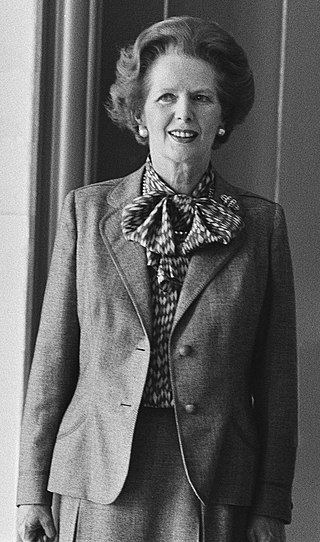
Margaret Thatcher became Prime Minister of the United Kingdom on 4 May 1979 and served until 28 November 1990. She was elected to the position after leading the British Conservative Party since 1975.

Margaret Thatcher was Prime Minister of the United Kingdom from 4 May 1979 to 28 November 1990, during which time she led a Conservative government. She was the first woman to hold that office. During her premiership, Thatcher moved to liberalise the British economy through deregulation, privatisation, and the promotion of entrepreneurialism.

Local elections were held in the United Kingdom on 3 May 1990. They were the last local elections held before the resignation of Prime Minister Margaret Thatcher in November 1990.
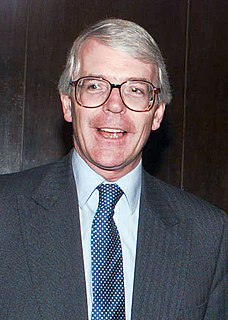
John Major formed the first Major ministry upon the resignation of Margaret Thatcher in November 1990, after being invited by Queen Elizabeth II to lead the next government.

